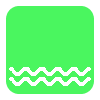A beginner's guide to island-hopping in Croatia
If the thought of Croatia's 1,244 islands and islets is a bit overwhelming, you'll be pleased to know that only about 50 are inhabited. Mind you, that still leaves a lot to see.

The good news is that Croatia has an extensive network of ferries and catamarans; it's up to you if you want to hire a car, go on foot or do a bit of both.
Catamarans are for foot passengers only and are cheaper than ferries, which charge extra for vehicles. Some islands have banned cars and are easy to explore, while others have meagre public transport, so you'll need your own wheels, whether two or four.
The three main ferry companies, Jadrolinija, Krilo and TP Line, have websites in English where you can book tickets in advance, which is vital during the summer. Here's how to create your own Croatian island odyssey.
Getting to Croatia: find great value holidays to destinations across Croatia with TUI*.
From Dubrovnik
Croatia's most visited tourist attraction is an appealing base for day trips to the Elaphiti Islands, or as the point of departure for southern Dalmatia.
Jadrolinija goes to all three of the inhabited Elaphiti Islands, Koločep*, Lopud* and Šipan, four times a day, so you could technically fit in all three islands in one day. If you want to stay the night (both Koločep and Lopud have banned cars), they're all slow-paced places made for relaxed swims, waterside meals and wanders through olive and pine groves.

It's tempting to take the catamaran to the green island of Mljet* and roam the lakeside trails of Mljet National Park. Foot passengers can take the Krilo catamaran to Pomena, which has a footpath to the national park, or the TP Line catamaran to Polače, another park gateway.
If you want to see more of this lush island, hire a car when you leave Dubrovnik and drive along the Pelješac Peninsula to take the car ferry from Prapratno to Sobra, where you can explore Saplunara's sandy beaches and the awe-inspiring Odysseus' Cave.
If you prefer not to drive, you can go from Dubrovnik* to Split via several enchanting islands. The first stop is Pomena in Mljet, before the catamaran continues to Korčula* and its exquisite walled capital.

From here, you go to Hvar Town on Croatia's sunniest island, which has chic beach clubs to go with beautiful baroque architecture and the hilltop Fortica Fortress. Last stop is Brač Island*, whose western port of Milna has beaches and a lively marina.
From Split
Croatia's second city of Split* is synonymous with island-hopping. Dalmatia's largest island, Brač, is home to Croatia's most famous beach, Zlatni Rat, near the village of Bol, accessed by catamaran from Split.
If you're on foot, you can come to Bol, swim in Zlatni Rat, maybe hike up to Vidova Gora, the highest point in the Adriatic islands. The catamaran carries on to Stari Grad and Jelsa in Hvar*, neither of which requires a car, but you can hire a bike to explore a bit further.
If you're driving, take the ferry from Split to Supetar on Brač's northern coast and explore pretty fishing villages and pebbly coves around its indented coast.
Catamarans run frequently between Split and Hvar Town, and car ferries go to Hvar's quieter town of Stari Grad. Just outside the town is UNESCO-listed Stari Grad Plain, where you can still see vineyards and olive groves planted by the Greeks 2,400 years ago.
One of Croatia's most remote islands is served by car ferry and catamaran. Little Vis is a delightful place of fishing villages and fabulous beaches. Komiža is the departure point for boat trips to the dramatic Blue Cave on nearby Biševo.
The island of Šolta, although clearly visible from Split's waterfront, is curiously overlooked but easy to reach by car ferry. Less touristy than its better-known neighbours, Šolta has cute little villages including Stomorska, Maslinica and the ferry port of Rogač, as well as pebbly coves tucked into its southern coast.

Most people visit the gorgeous island town of Trogir*, connected to the mainland via a bridge, by car, but the ferry is a more entertaining option. The ferry carries on to the small islands of Drvenik Veli and Drvenik Mali, two mellow places to kick back and get into the spirit of lazy Dalmatian life.
From Zadar
The islands around Zadar are more low-key than their southern counterparts, usually frequented by locals with family houses or by the sailing crowd. Opposite Zadar is Ugljan, a 25-minute catamaran journey and a lovely place to swim and lunch in the port of Preko, then hire a kayak and paddle to the monastery islet of Galevac.
Further afield is Dugi Otok, which suits its name, meaning "long island". You'd need a car to get the most out of this sleepy place, whose southern end is taken up by Telašćica Nature Park and its 25 coves and six islets.
The island of Pag is probably the most straightforward to visit if you have a car; just drive across the bridge that connects it to the mainland just north of Zadar.
There's a double treat in store if you take the catamaran from Zadar to the car-free island of Silba. This compact island is so committed to a slower pace of life that it's even banned bicycles during the peak summer season.
From this zen-like place, take the catamaran to the fragrant island of Lošinj, an alluring mixture of Venetian-style villages, intimate beaches and pine-fringed footpaths. This route from Zadar is one way of reaching Lošinj, which is in the Kvarner Gulf.
From Rijeka
Speaking of which, Rijeka Airport is actually on the Kvarner Gulf-island of Krk, which is tied with its neighbour, Cres, as the two largest in Croatia. You'll probably want a car for ease of getting around from Rijeka. Flop on Krk's beaches in Baška Bay and explore Krk Town's medieval and Venetian lanes before taking the ferry to the small island of Rab.

Despite its size, Rab squeezes in at least two dozen sandy beaches, a rarity in a country of pebbles and rocks. Rab Town is breathtaking in its beauty and worth the effort to visit.
Once you're back in Krk, you can take the ferry to Cres, one of Croatia's least populated islands. Check out pretty Cres Town and the beaches at Valun and Lubenice before reaching the arty town of Osor, where the swing bridge connects Cres with Lošinj.
When you check out the sailing schedules, you'll see how relatively straightforward it is to meander along the Adriatic's islands and plot your next adventure.
Climate in Croatia
| Jan | Feb | Mar | Apr | May | Jun | Jul | Aug | Sep | Oct | Nov | Dec | |
|---|---|---|---|---|---|---|---|---|---|---|---|---|
| Maximum daytime temperature °C |  8 8 |
 10 10 |
 12 12 |
 16 16 |
 21 21 |
 25 25 |
 28 28 |
 28 28 |
 25 25 |
 19 19 |
 14 14 |
 10 10 |
| Hours of sunshine (daily) | ||||||||||||
| Days with some rainfall |  13 13 |
 13 13 |
 13 13 |
 13 13 |
 12 12 |
 13 13 |
 10 10 |
 9 9 |
 10 10 |
 12 12 |
 14 14 |
 14 14 |
| Sea temperature °C |  14 14 |
 13 13 |
 13 13 |
 14 14 |
 18 18 |
 21 21 |
 24 24 |
 24 24 |
 22 22 |
 20 20 |
 18 18 |
 16 16 |
The above guide shows the climate in Split. Find out more about conditions across the country in our complete guide to the climate in Croatia.
Ready to hop Croatia's islands? Browse the latest online offers on holidays with TUI, which operates from airports across the UK.
More about Croatia
- Overview
- Best time to visit
- Weather by month
- 5-day weather forecast
- Destinations
- Travel advice
- Deals & discounts
Croatia by month
Jan Feb Mar Apr May Jun Jul Aug Sep Oct Nov Dec
Explore holidays in the sun for less
- Beach holidays
- Family holidays
- City breaks
- Summer holidays
- Winter sun holidays
- Holiday offers
- Top travel brands
- Airlines & flights
- Discount hotels
- Airport parking deals
- TUI
- Jet2holidays
- easyJet holidays
- Love Holidays
- January sales
Airport parking
- Manchester Airport
- Stansted Airport
- Bristol Airport
- Luton Airport
- Birmingham Airport
- Edinburgh Airport
- Gatwick Airport
- Glasgow Airport
- Newcastle Airport
Airport lounges
- Manchester Airport
- Birmingham Airport
- Bristol Airport
- Edinburgh Airport
- Glasgow Airport
- Heathrow Airport
- Newcastle Airport
- Stansted Airport
- Gatwick Airport
Be inspired
Get your weekly fix of holiday inspiration from some of the world's best travel writers plus save on your next trip with the latest exclusive offers
We promise not to share your details






















